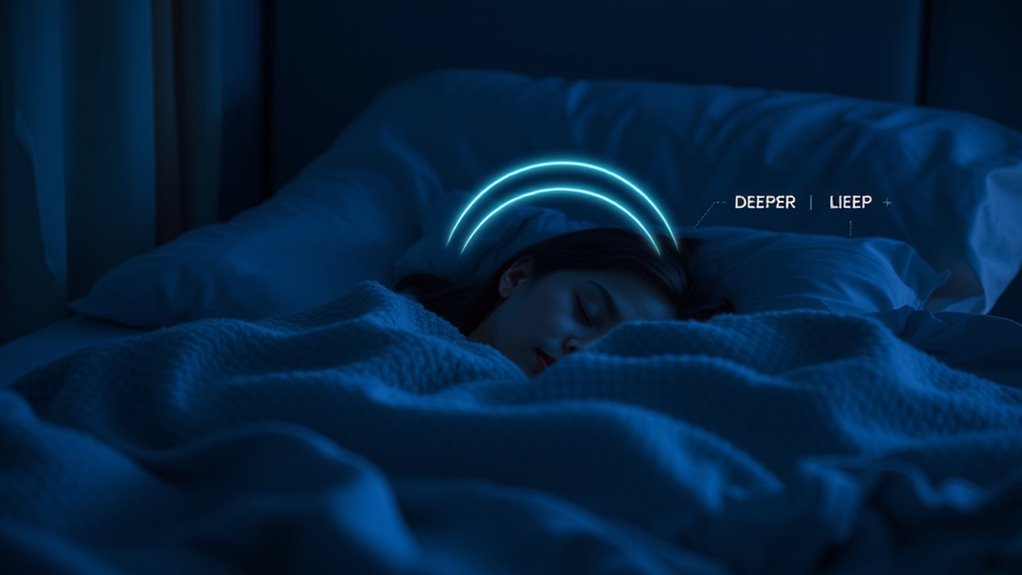Understanding your sleep cycles helps you see how REM, deep sleep, and light sleep each support your body and mind. REM is when you dream, boost memory, and process emotions. Deep sleep restores your body through tissue repair and immune support. Light sleep acts as a bridge between wakefulness and deep sleep, aiding shifts and memory. Knowing how these stages work together can improve your sleep quality—exploring further reveals ways to optimize your rest.
Key Takeaways
- Sleep cycles repeat every 90 minutes, cycling through light sleep, deep sleep, and REM stages, each with distinct functions.
- REM sleep involves rapid eye movements, vivid dreaming, and is vital for emotional regulation and memory consolidation.
- Deep sleep (slow-wave sleep) occurs early in the night and supports physical restoration, immune function, and neural repair.
- Light sleep acts as a transitional phase, helping the body shift between wakefulness and deeper sleep stages.
- Factors like stress, lifestyle, and environment influence the progression and quality of sleep stages, affecting overall well-being.
The Stages of Sleep: An Overview

Understanding sleep cycles begins with recognizing the different stages your body moves through during a night’s rest. These stages include light sleep, deep sleep, and REM sleep, each serving unique functions. As you progress through these phases, your brain consolidates memories, which influences dream recall, especially during REM. Improving sleep hygiene—like maintaining a consistent sleep schedule, limiting screen time before bed, and creating a comfortable environment—helps you shift smoothly between stages. This consistency can boost your ability to remember dreams and enhance overall sleep quality. Being aware of these stages allows you to better understand your sleep patterns and how each phase contributes to your physical and mental health. Proper sleep hygiene supports a balanced cycle, making your rest more restorative and your dream recall more vivid. Recognizing the importance of sleep cycles can lead to healthier habits that improve your overall well-being.
What Is Rapid Eye Movement (REM) Sleep?

Rapid Eye Movement (REM) sleep is a distinct phase of your sleep cycle characterized by quick, darting movements of your eyes beneath closed eyelids. During REM, your brain becomes more active, and this is when most dreaming occurs. If you experience frequent REM cycles, you’ll likely have better dream recall, as this stage is closely linked to vivid dreams. Conversely, sleep deprivation can reduce REM sleep, making it harder to remember dreams and leaving you feeling unrested. REM sleep also plays a crucial role in emotional regulation and memory processing. As you cycle through sleep stages, REM periods lengthen, offering more time for restorative dreaming. Understanding REM sleep helps you appreciate its importance for mental health and overall well-being. Incorporating eco-friendly sleep habits can also enhance your sleep quality and overall health.
The Importance of Deep Sleep
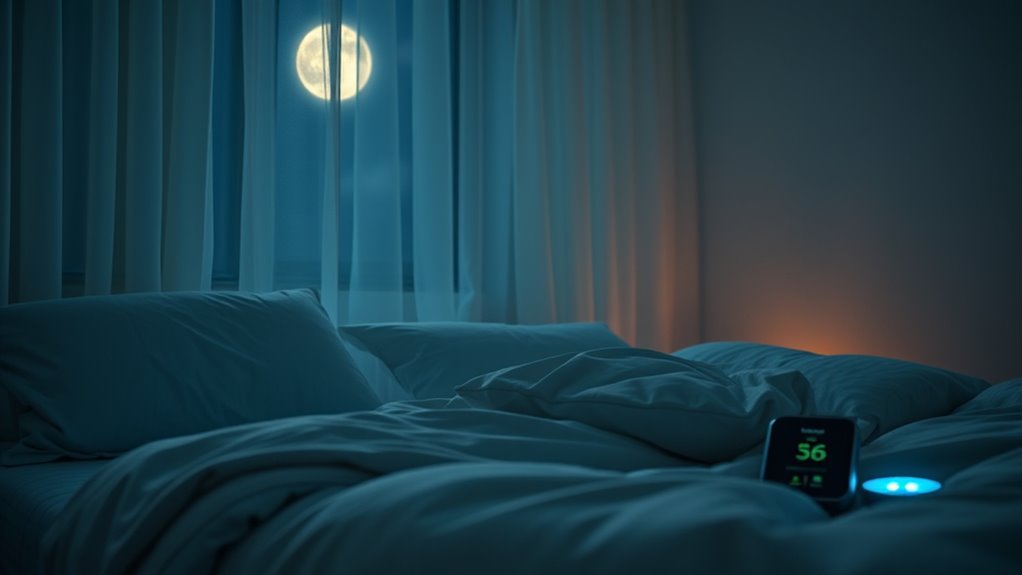
Deep sleep is essential because it helps your body repair itself and stay healthy. During this stage, your memory gets stronger, and your immune system gets a much-needed boost. Skipping out on deep sleep can leave you feeling tired and more vulnerable to illness. Additionally, ensuring proper sleep cycle management can improve overall sleep quality and health.
Restorative Body Functions
Deep sleep is the most essential phase for your body’s restorative processes, allowing tissues to repair, strengthen your immune system, and restore energy levels. During this stage, your body performs critical functions like cell regeneration and toxin removal. A proper sleep environment promotes deep sleep, helping you relax and minimize disruptions. To enhance restorative body functions, avoid disturbances that interfere with deep sleep. For example, a quiet, dark, and cool room supports your body’s repair processes. Additionally, engaging in dream analysis can provide insights into emotional health, indirectly benefiting your physical recovery. Prioritizing deep sleep ensures your body heals effectively, keeping you energized and resilient throughout the day. Creating a sleep-friendly environment can further optimize your restorative sleep stages.
Memory Consolidation Effects
Since sleep plays a critical role in how your brain processes and stores information, experiencing sufficient deep sleep is essential for effective memory consolidation. During deep sleep, your brain strengthens neural connections, helping you retain new skills and knowledge. A good sleep environment—dark, quiet, and cool—can improve your chances of reaching deep sleep stages. When you get enough deep sleep, you may notice better dream recall because vivid dreams often occur in REM, but the restful state supports overall memory processing. Without enough deep sleep, your ability to remember details and learn new information diminishes. Prioritizing quality sleep encourages your brain’s natural memory consolidation processes, ensuring your memories are securely stored and easily accessible later.
Immune System Boost
Have you ever wondered how sleep influences your immune defenses? Deep sleep plays a crucial role in strengthening your immune response and boosting infection resistance. During deep sleep, your body releases cytokines, which help fight off pathogens and reduce inflammation. Adequate deep sleep ensures your immune system functions at its best, making it easier to ward off illnesses. Without enough deep sleep, your immune defenses weaken, increasing vulnerability to infections. Prioritizing quality sleep helps your body repair and regenerate immune cells, maintaining resilience against diseases. To maximize immune benefits, focus on consistent sleep routines and managing stress. Remember, deep sleep isn’t just about feeling rested—it’s essential for a robust immune system and overall health. Understanding the science behind sleep can help you optimize your sleep habits for better health.
Light Sleep: The Transition Phase

Light sleep, also known as the passage phase, serves as the bridge between wakefulness and deeper sleep stages. During this time, your body begins to relax, and your brain activity slows down. Your circadian rhythm plays a key role in regulating this shift, signaling your body when it’s time to wind down. Light sleep is characterized by slower eye movements and reduced muscle activity, helping you prepare for restorative deep sleep. If you struggle to fall asleep, light therapy can help reset your circadian rhythm, promoting smoother transitions into sleep. This phase is essential for mental and physical recovery, as it sets the stage for deeper, more restorative sleep. Understanding this transition can improve your overall sleep quality and health. Additionally, emerging technologies like sleep tracking devices offer insights into your sleep patterns, enabling tailored strategies for better rest.
How Sleep Cycles Progress Throughout the Night
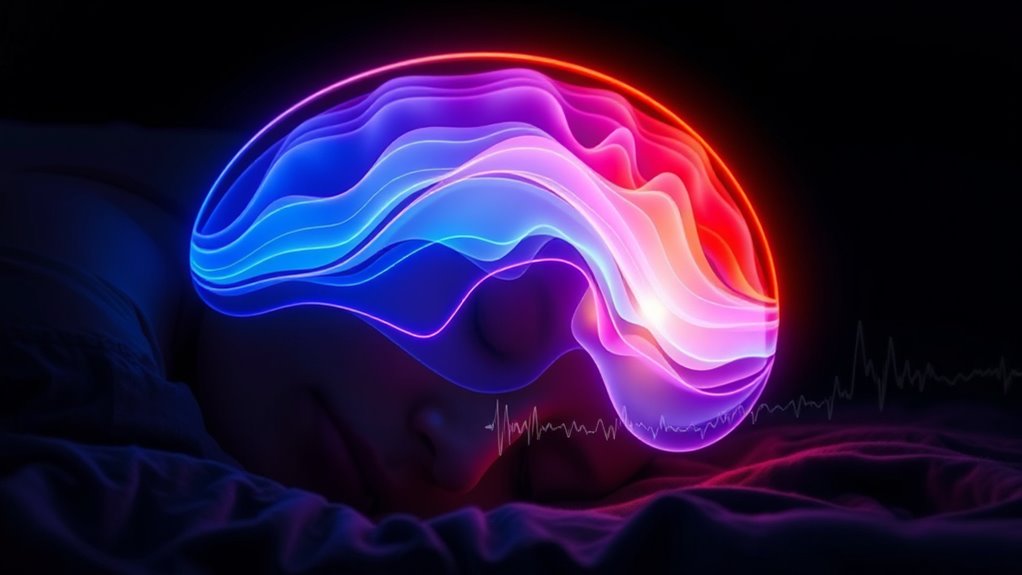
As the night goes on, your sleep stages shift in a predictable pattern, with each cycle becoming longer or shorter. You’ll notice shifts between light sleep, deep sleep, and REM, affecting how restful your sleep feels. Understanding these changes helps you see how your sleep quality varies throughout the night. Additionally, maintaining a consistent sleep schedule can support the natural progression of these sleep cycles, promoting better overall rest.
Sleep Stage Transitions
Sleep stage progressions occur in a predictable pattern throughout the night, guiding your body through different phases of rest. As you drift into sleep, you cycle from light sleep to deep sleep, then into REM. These shifts happen roughly every 90 minutes, repeating multiple times. Tracking your sleep stages in a dream journal can help identify patterns and disruptions. Your sleep environment, including darkness and comfort, influences how smoothly these transitions occur. Sudden awakenings or irregular cycles may indicate disturbed sleep. Recognizing these stage shifts helps you understand how your body repairs itself and consolidates memories. Being mindful of your sleep habits allows you to optimize each transition for better rest and overall health. Consistency and a calming sleep environment are key to smooth sleep stage transitions. Incorporating mindful sleep practices can further enhance your sleep quality and cycle regularity.
Cycle Duration Changes
Throughout the night, the duration of your sleep cycles changes, affecting how long you spend in each stage. Early cycles tend to have longer deep sleep phases, while later ones feature more REM sleep. These shifts influence your overall sleep quality and how your brain processes experiences, including dream analysis. Your sleep environment plays a key role in maintaining consistent cycle patterns; a quiet, dark, and comfortable space helps stabilize these progressions. As the night progresses, your cycles become shorter, with REM periods lengthening, which can lead to more vivid dreams. Recognizing these cycle duration changes helps you understand why waking at different times can feel different—sometimes invigorating, sometimes groggy. Adjusting your sleep environment guarantees smoother progressions, supporting healthier, more restorative sleep.
The Role of Each Sleep Stage in Physical Restoration
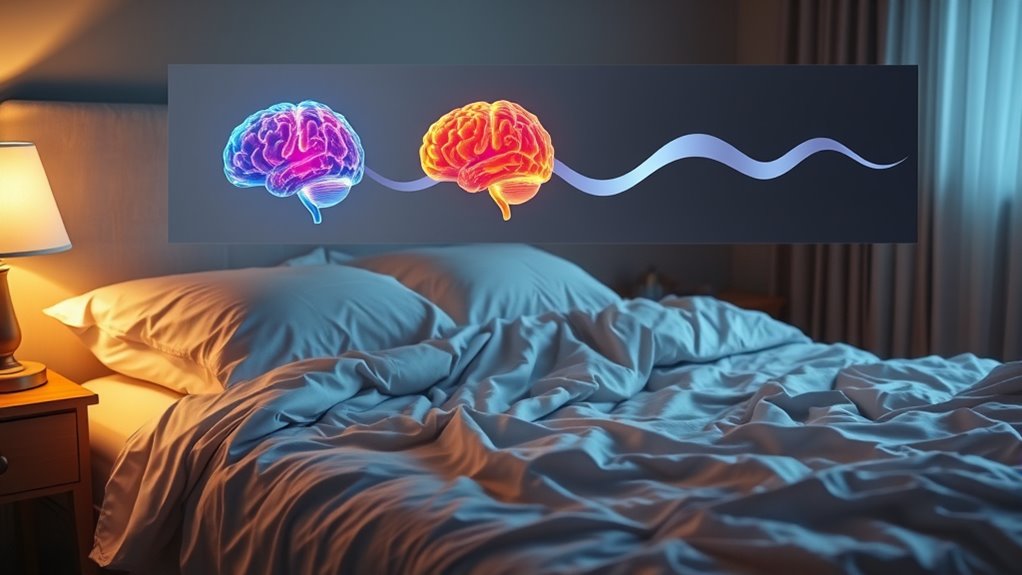
Each sleep stage plays a distinct and essential role in physically restoring your body. During deep sleep, your muscles repair tissue, build bone and muscle, and strengthen your immune system. REM sleep supports dream therapy, helping your brain process emotions and memories, which is crucial for overall recovery. Light sleep acts as a bridge, preparing your body for deeper stages. Your sleep environment influences this process—optimal conditions promote restorative sleep. Incorporating soundscapes and voiceovers can enhance the quality of your sleep by creating a calming environment that facilitates these stages.
- Boosts immune function and tissue repair
- Facilitates muscle growth and healing
- Supports hormone regulation
- Enhances blood flow and nutrient delivery
- Prepares your body for cognitive functions later
Understanding how each stage contributes helps you optimize your sleep for better physical health and recovery.
Cognitive Benefits of Different Sleep Phases
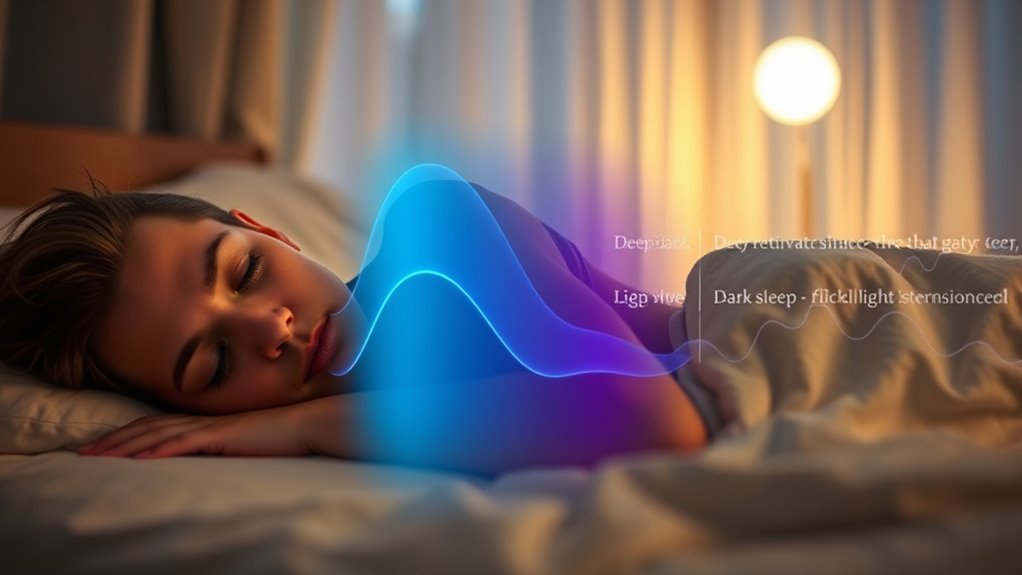
Your sleep stages play a vital role in sharpening your mind. During certain phases, your brain consolidates memories, making learned information stick. Other sleep phases boost your creative problem-solving skills, helping you think outside the box. Interestingly, the different sleep stages influence how well your brain performs in various cognitive tasks.
Memory Consolidation Processes
Have you ever wondered how a good night’s sleep helps your brain remember what you’ve learned? During sleep, your brain actively consolidates memories, especially in stages involving sleep spindles. These brief bursts of brain activity support processing and storing information. Dream recall often occurs when REM sleep is prominent, reinforcing memory traces. Light sleep helps stabilize new memories, while deep sleep strengthens them further. Sleep spindles play a vital role in filtering out irrelevant information, allowing important data to be solidified. Proper sleep cycles optimize this process, making your learning more effective. Additionally, the contrast ratio in different sleep stages influences the clarity and strength of memory consolidation, emphasizing the importance of balanced sleep architecture.
Creative Problem Solving
Different sleep phases uniquely contribute to creative problem solving by shaping your brain’s ability to generate novel ideas and connect disparate concepts. During REM sleep, dream analysis taps into your subconscious, allowing your mind to explore new associations and perspectives. This phase enhances your ability to think outside the box and develop innovative solutions. Deep sleep, as part of sleep architecture, helps reset neural connections, fostering mental clarity and focus. Light sleep supports memory integration, which indirectly boosts creativity by strengthening relevant knowledge. Additionally, research indicates that vetted sleep products can improve overall sleep quality, thereby optimizing these cognitive benefits. Together, these phases optimize your brain’s capacity for flexible thinking. By understanding how each sleep stage influences your cognitive processes, especially through dream analysis and sleep architecture, you can better harness sleep’s power to improve your creative problem-solving skills.
Factors That Influence Your Sleep Cycles

Several factors can profoundly influence your sleep cycles, shaping the quality and duration of your rest. These factors affect your sleep architecture, including REM patterns and how your body shifts through different sleep stages. For example, stress or irregular schedules can disrupt the natural progression of light, deep, and REM sleep, leading to fragmented rest. Age and health conditions also play a role, altering sleep architecture and affecting REM cycles. Additionally, lifestyle choices like caffeine or alcohol intake, physical activity, and exposure to screens can modify your sleep patterns. Understanding these influences helps you optimize your sleep environment and habits for better rest. Factors such as sleep environment and noise levels can significantly impact sleep quality by either promoting restful sleep or causing disturbances.
Recognizing Sleep Disruptions and Their Effects
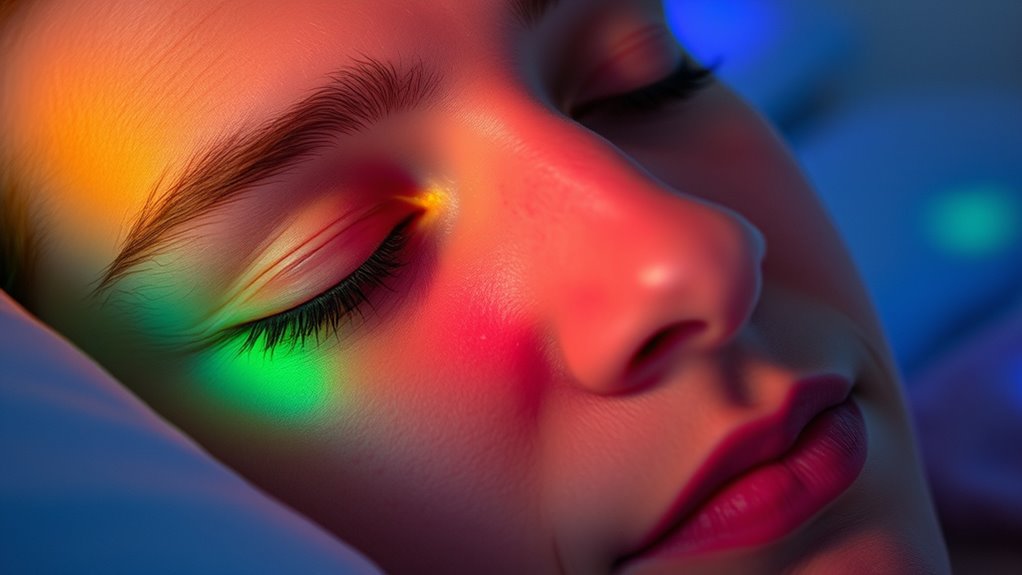
Recognizing sleep disruptions is essential because they can considerably impair the quality of your rest and overall health. If you notice frequent awakenings, vivid or unsettling dreams, or trouble falling asleep, it might be time to explore dream interpretation. These signs can indicate underlying issues, such as sleep disorders that require detection. By paying attention to how you feel during the day—like persistent fatigue or difficulty concentrating—you can better identify disruptions. Detecting sleep disorders early helps you address issues like sleep apnea or restless leg syndrome before they worsen. Understanding your sleep patterns enables you to take control and seek appropriate treatment if needed, ultimately improving your rest and overall well-being. Implementing efficient sleep solutions can further aid in establishing healthier sleep habits and optimizing sleep quality.
Tips to Optimize Your Sleep Cycle for Better Rest
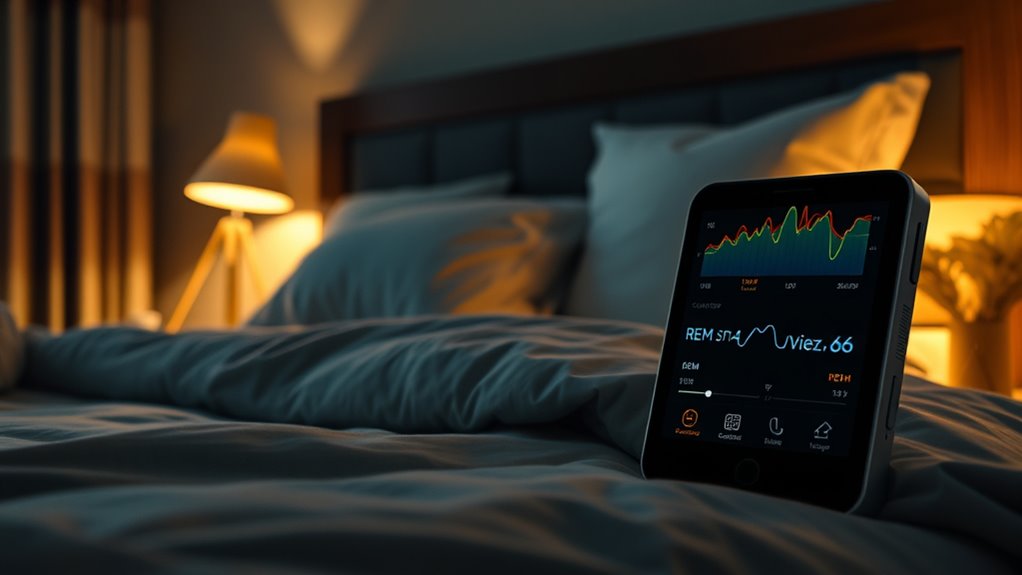
Improving your sleep cycle starts with making simple, consistent adjustments to your daily habits. Creating a calming sleep environment can markedly boost your rest, so keep your bedroom dark, cool, and quiet. Establish a regular sleep schedule, going to bed and waking up at the same time every day. Engaging in dream analysis can help you identify stressors or patterns disrupting your sleep. Avoid screens before bed, as blue light hampers melatonin production. Incorporate relaxing activities like reading or gentle stretching. Limit caffeine and heavy meals close to bedtime. Tracking your sleep patterns helps you recognize disruptions and adjust accordingly. By focusing on your sleep environment and understanding your dreams, you set the foundation for a healthier, more restorative sleep cycle. Embracing a consistent routine can also reduce the risk of remote work burnout, which often affects sleep quality and overall well-being.
Frequently Asked Questions
How Long Does Each Sleep Stage Typically Last?
The duration of each sleep stage varies, affecting your overall sleep quality. Typically, light sleep lasts about 10-15 minutes per cycle, while deep sleep can range from 20-40 minutes, and REM sleep varies from 5-30 minutes. Sleep duration and sleep variability influence how long you spend in each stage, impacting your restfulness. You might notice patterns or changes in your sleep cycle that affect how refreshed you feel in the morning.
Can Sleep Cycles Vary Significantly Between Individuals?
Did you know that sleep pattern variability can be quite high, with individual sleep differences influencing your sleep quality? Yes, sleep cycles can vary markedly between people due to genetics, age, or lifestyle. You might find that your REM or deep sleep stages are longer or shorter than others. This variation means your ideal sleep duration and quality might be unique, emphasizing the importance of listening to your body’s signals.
What Factors Cause Disruptions in REM Sleep?
Disruptions in REM sleep can happen because of factors like sleep apnea, which causes brief awakenings and interrupts your REM cycles. Caffeine consumption, especially late in the day, makes it harder for you to fall into or stay in REM sleep. Stress and irregular sleep schedules also play a role. To improve REM sleep, try reducing caffeine intake and addressing sleep apnea with medical advice.
How Do Age and Health Affect Sleep Cycle Patterns?
Did you know that by age 50, deep sleep drops by about 45%? Your age and health considerably influence your sleep cycle patterns. As you get older, age-related changes can cause shorter REM and deep sleep phases, making you wake more often. Health-related disruptions, like stress or illness, can further disturb these cycles, leading to poorer sleep quality. Staying healthy and managing stress helps maintain more consistent sleep patterns.
Is It Possible to Consciously Control or Influence Sleep Stages?
You can’t fully control sleep stages, but you can influence them through practices like lucid dreaming and increasing sleep stage awareness. By becoming aware of your sleep patterns, you might consciously promote REM sleep or deep sleep phases. Techniques such as meditation or keeping a sleep journal help boost your awareness, potentially allowing you to guide your sleep experience more intentionally. While complete control remains elusive, these methods can improve your overall sleep quality.
Conclusion
Understanding your sleep cycles helps you prioritize quality rest. Did you know that during a typical night, your body completes about 4 to 6 full cycles, each lasting roughly 90 minutes? By optimizing your sleep habits, you can guarantee more time in restorative deep and REM sleep. Better sleep not only boosts your memory and mood but also strengthens your immune system. Prioritize your sleep, and you’ll wake up feeling refreshed and ready to conquer the day.
